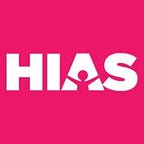by Sharon Samber
Nairobi, Kenya — Each Tuesday, HIAS staff at the field office in Kawangware, a sprawling residential area in the western part of the Kenyan capital, travel to a church complex in Rongai in order to provide services to anyone who comes. Outside a squat, concrete building, refugees sit patiently on benches as they wait to consult with aid workers inside. Because the building is affiliated with a church, there are no HIAS signs anywhere. But the refugees who have come know where to go.
The Kenyan government requires all refugees to reside in official camps established in multiple locations around the country. But the camps do not encompass the country’s entire displaced population. Some 95,000 refugees — and 18,500 additional stateless individuals — live in Nairobi and other cities. Much of this population chooses to reside in urban dwellings due to concerns about poor conditions and insecurity in the camps. Doing so legally requires an exemption letter from the Kenyan government.
The staff at Kawangware, one of four HIAS offices in Nairobi, realized that many of the refugees they serve who come from the Democratic Republic of the Congo (DRC) and South Sudan do not have the means or the money to travel the 13 miles to the regular office. And so the Kawangware office goes to the clients rather than the other way around.
On average, the staff sees about 40–50 people at the outreach site, with usually only a few new clients coming each week. Staff provide mental health services, gender-based violence (GBV) prevention and response, legal aid services, and child protection services. The refugees live in slums and can’t get jobs because they struggle to obtain documentation — though some are able to work in construction or sell goods on the street as part of the informal economy.
“Here, living is hard,” said Sylvia Mwongo, a HIAS Kenya mental health officer, said. “In the field office you see the reality.”
Other challenges facing the refugees in Rongai include a language barrier, as even Congolese refugees who know Swahili speak a different dialect from that spoken in Kenya. In addition, Mwongo explained, stigma about sexual abuse in Congolese culture often prevents women from disclosing what happened to them. HIAS staff offer GBV group sessions and work with community-based organizations who might be able to take those in abusive homes and give them temporary shelter.
On a recent day, Joseph*, a refugee from the DRC, told a counseling psychologist that “if it was not for the holistic interventions I got from HIAS through counseling and financial assistance, I would have ended my life.” Joseph said he would “forever be grateful to HIAS for their support and positively changing my life.”
A similar outreach situation plays out at the HIAS Kayole office. Staff there goes to the Kasarani area to provide services to refugees mainly from the DRC, Burundi, Rwanda, as well as some from Somalia and South Sudan. Mental health counselors perform health, disability, and social assessments, and conduct follow ups to make sure they are properly identifying all of the clients’ needs. Usually between 25 and 60 clients come to the outreach site on Thursdays.
Joyce Sirengo, the Kayole sub office coordinator, said staff exercise extra caution when attending to GBV survivors and members of the LGBTQ community, sometimes choosing to conduct tele-assessments and tele-counseling. “We want to ensure they receive services in a safe and dignified manner,” she said.
But home visits provide benefits beyond simply meeting refugees where they are. Visits help identify all the issues that the client may be facing and give a more complete view of the client’s situation, from how all members of the extended family may be impacted to availability and access to clean water and other resources.
*Pseudonym used for client’s protection.
Originally published at https://hias.org on August 31, 2023.
